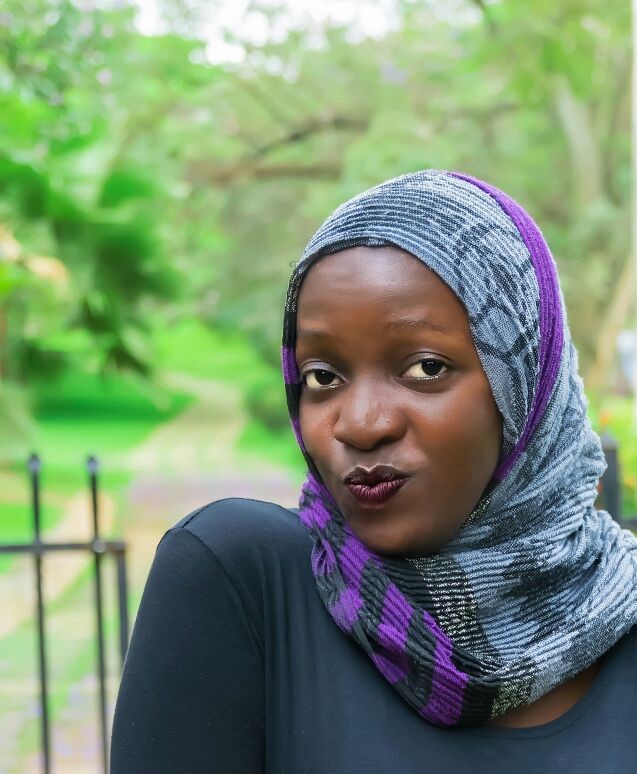
Konya Shamsrumi: What is the process of writing a poem like for you? Is it a lot of hard work or easy?
Hawa Nanjobe Kimbugwe: Whoa! I wish I had a direct answer to this, like a straight up ‘Yes’ or ‘No’. But I don’t. My writing, oftentimes, is not planned out. I write when or if I’m inspired to, when I’m in a situation that has prised me to, when I have read about or heard a touching story, when someone I know is in a moment regardless of whether it is a happy or a sad one… when I relate my ideal with the bitter reality and I’m trying to marry the two but mostly I write because I can.
My process of writing a poem is not a one-way road (okay maybe for the case of Uganda, it could be *winks*). The process varies, depending on where I am, the variety of things my mind is encountering, the state my mind is in, how linear my thought process is in that moment. The mind keeps roaming and staying on track even within a moment can be tricky.
This implies that, sometimes, the process is easy, other times it is hard. Yet, other times yet, it is harder than hard and I always have to work to measure up. When my mind is thinking, my emotions are hiking and my thoughts are structuring themselves, I try to put them in sync using ink and paper or fingers and a tab so I can draw lines without a ruler and at the end, these will be Poems. It is easily challenging but I appreciate the process of each only when I have the finished poem in my hand.
Konya Shamsrumi: Please describe your sense of identity in this or any possible world in imagery or metaphor?
Hawa Nanjobe Kimbugwe: I’m a sea or an ocean, deep and wide. However, most people prefer to stop at the shores. If you dared to ski or dive, you’d know better.
Konya Shamsrumi: If any of your poems could literally save a person’s life, which poem would it be and can you describe the person whose life you think it would have saved?
Hawa Nanjobe Kimbugwe: That poem would be the one titled “Mirembe, They Call It!” I think that poem could save the world’s inhabitants. It explores our differences, how and why we should accept and appreciate them. In addition, it demonstrates the ironies of how we have more things that connect us than divide us even as we systemically – unconsciously – choose to focus on the trivialities that divide us, which create superiority and inferiority complexes that affect us differently as individuals.
That poem would heal every individual, leaving no scar. It would help such a one live with the utmost necessities in life, the seeking of Inner Peace, Contentment and Happiness, while enabling such a one to learn to understand people more and judge them less.

Konya Shamsrumi: What does Africa mean to you, as potential or reality?
Hawa Nanjobe Kimbugwe: In reality, Africa is everything and anything that it is based on an Original. Its Potential, to me, is overwhelmingly mind blowing. It has the best weather, best resources, best cultures, best in everything more than any continent on this planet can have in total.
The challenge it has is its people and yet that is where the potential lies. I envision an Africa that will master the art of living a life of “Agali awamu gegaluma enyama”—a Luganda idiom that speaks to teamwork. Directly translated, it comes to “the teeth that are together are the ones that bite the meat”. As we all know, one tooth alone cannot chew meat. The second or minute or hour or day or week or month or year that each one of us, as an African, learns to live a value-based life and know that you’re not fine as an individual if the rest of the people that surround you are not fine is the time Africa will start to bear the fruits of its potential.
The effects of neo-colonialism are still with us. So we are hesitant to support fellow Africans in all aspects, be it Economics, Politics or the Creative Arts. Hence, we lack solidarities and a support system amongst ourselves. We are quick to kill each other, cheat each other, betray each other, despise each other and these vices are still deterring our progress more than we know or ever will.
I don’t believe though that Africans will continue to play victim or the blame game of “colonial rule and its effects”. It is long overdue that the past be left behind, for us to work with what we have, and soar.
Konya Shamsrumi: Could you share with us one poem you’ve been most impressed or fascinated by? Tell us why and share favourite lines from it.
Hawa Nanjobe Kimbugwe:
MIREMBE, THEY CALL IT
If the world hates you,
Know that it hated me first
Prized out of me its trust so never do I quench my thirst
Because above me is gravity and beneath me is up thrust
Forces that pull and push me away
It’s only through hell and high water that I find my way
To a path
A path filled with skulls, corpses and broken glasses
Hoping, skipping and jumping, I trot
And cave into a place I’d never crave, the grave.
To finally peace the pieces with in
But I lay restlessly here in
I still hear the homosapiens on the other side
I hear men crying like women for what they can’t defend
I hear men becoming women in bid to amend the rend they fail to mend.
I envision them walking with eyes covered with nets
Pockets full of pistols filled with bullets
Hearts out of their thoracic cavities
Their heads raised high on top of their necks
Fingers pulling triggers
Their feet trembling on their heels tip toeing.
I view their souls collapsing in unrelenting agony
Trying hard to crawl out of this mess
Not to lose face
But it’s too late
We’re verily in total loss, mate
Innocent people lost lives to calamities so artificial
Guilty ones acting superficial
I’m compelled to ask myself,
What is this? What is this?
What happened?
What happened to Shalom
Where harmony and laughter were louder than silence?
But now we Life is worse than a death sentence,
We live but as survivors
Existing only because Palestine, Iraq, Syria, Paris Libya and Nigeria are not our residences
All we do is face book about their occupants incidences
And still remain with the moral audacity to introduce ourselves as human beings
I guess this is what they mean when they say “there’s a difference between a human being and being human’’
What happened? What happened to Shalom?
Where we were concerned more about the neighbour next door than owning a LouisVinton
But now we live encaged in gates and fences
With our eyes glue-stuck on movies and series,
That preach distrust, revenge, hatred and not Love, Trust and Forgiveness
So our happiness is derived from “anti-depressant pills’’
Because trusting the media has got us thinking our closest allies may actually be our greatest enemies.
Yet we heedfully pick leaves and amazons from it.
Whoa! On to us, for now our minds browse and process evil perceiving it as good business
Our actions are a delusion,
An illusion of sorts,
Where we fight for Peace and Liberty
But we often take paths that lead us to crossroads that get us taking sides.
Where Abdul Raheem and Ibrahim can’t talk to Malcom and Tom.
And Flower the mini skirtie can barely stand Hawa the hijabie
What happened to Salaam
Where unity was an S.I unit of humanity
But now humanity has been narrowed and streamlined to flow along religious, cultural, technical know who’s and racial lines
Never considering the fact that these are just acquired impositions
And before all of them we are all humans
But we proceed by all means,
To live like a nest of cockroaches that camouflage and hide in crevices in the absence of darkness
But wander about contaminating and predating whatever surrounds them in the absence of light.
Only difference is cockroaches do not discriminate.
So I’m now unlearning to re-learn
To give Peace, Salaam, Shalom and Mirembe not as names but attributes.
I’m seeking to give Peace. Salaam, Shalom and Mirembe
I’m giving to seek Peace, Salaam, Shalom and Mirembe.
Hawa Nanjobe Kimbugwe is a Passionate Poet based in Uganda. Her poetry journey commenced in high school at Nabisunsa Girls’ School, it grew and was raised via the Lantern Meet of Poets’ Foundation, and she married it in Kitara Nation where she’s a Founding Member and currently, Administrator. She believes poetry is going to be her future husband’s co-husband… Her relationship with it contains the “till death do us part..” vow.
Hawa has co-published a poetry anthology with her sister, Fahima Kimbugwe, titled “PHASES.”
Her poetry has been performed by students and other poets in Uganda, has been read by people worldwide. She has performed at various schools, book launches, workshops and conferences. She has also performed at the Bayimba International Festival, the Kampala International Festival and participated in the first ever East Africa Poetic Hour Battle, in 2018, in Kisumu.
Facebook : Hawa Nanjobe Kimbugwe
Instagram : hawa.n.kimbugwe
Twitter : @HawaKimbugwe












Leave a Reply